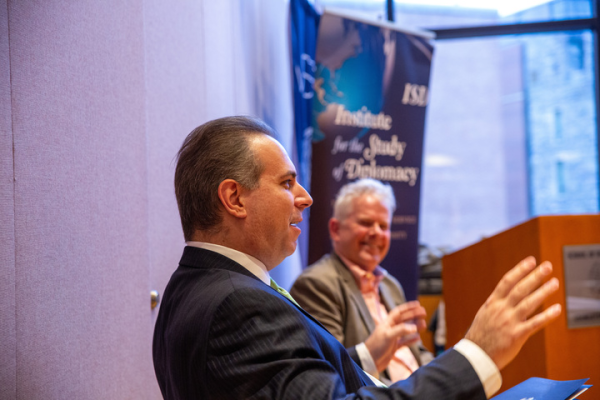During a visit to the United States, Montenegro’s Minister of Foreign Affairs discussed his country and its relationship to the enlargement of the European Union (EU) at a Jan. 30 Georgetown event.
The Georgetown Institute for the Study of Diplomacy (ISD), the BMW Center for German and European Studies and the Center for Eurasian, Russian and East European Studies co-hosted the event. Professor Jeffrey Anderson moderated the conversation with Minister Filip Ivanović.
Ivanović said a goal of his visit is to strengthen Montenegro’s relations with the United States, its North Atlantic Treaty Organization (NATO) ally, which has close ties to several members of the EU.
“We want to deepen the relations we have with the United States in different areas, not just national security, but also in democratic, environment, economy, investments, research, science, energy and so on,” Ivanović said at the event. “So part of my mission during this trip to the United States is to talk to different political and social actors, stakeholders and at universities to present the Montenegrin story.”
According to Ivanović, since the Russian invasion of Ukraine in February 2022, members of the EU have invested additional time into talks about the accession of new states, including Montenegro.

“If there is one thing good that came out of the tragedy that’s happening in Ukraine, it is that it serves as a sort of wake-up call to the European Union institutions and to EU member states,” Ivanović said. “They realized that setting aside the enlargement and not being committed to expanding the European Union, perhaps contributed to the ability of Russia to Ukraine.”
Ivanović added that a NATO partnership will greatly enhance Montenegro’s security, as it is a small country that lacks a large military presence and relies on its Italian and Greek allies for functions like airspace policing.
“Montenegro is a tiny country with 600,000 people living there; there’s not a big and powerful army, so we rely on NATO partners,” Ivanović said.
Montenegro’s accession to the European Union is delayed due to the stringent requirements of the chapters of the acquis, which necessitates comprehensive reforms in areas such as rule of law, economic stability and administrative capacity. The process is also influenced by the EU’s internal dynamics, including enlargement fatigue among member states and regional issues in the Western Balkans.
Prime Minister Milojko Spajić has led the country since his election in October 2023 and is a staunch supporter of the EU. Ivanović said joining the EU is a priority of Montenegro and its ministry.
“We have been negotiating with the European Union for the past almost 12 years,” said Ivanović. “Our goal is to become a member of the European Union by 2028.”
Ivanović said Montenegro has to fulfill the acquis, or binding obligations all EU members must follow, as part of the EU integration process. The acquis includes unilaterally adopting the euro and achieving free travel rights for its citizens within the Schengen area.
“You need to make progress in the chapters dedicated to the rule of law and the fight against organized crime and corruption,” Ivanović said. “Only when you show progress in these chapters, you can continue negotiating and closing the other chapters.”
Barbara Bodine, director and distinguished professor in the practice of diplomacy, said Montenegro has made financial strides toward integration via its adoption of the euro as currency.
“The stable use of the euro has set up extensive internal mechanisms to comply with a litany of rules and regulations required for full EU ascension to take place,” Bodine said.
Ivanović said the anti-corruption chapter had delayed Montenegro’s progress in the accession negotiations for several years. However, the EU Accession Conference positively received Montenegro’s implemented reforms during the conference’s ministerial meeting between representatives of EU member states and Montenegro held in Brussels, Belgium Jan. 29.
“Montenegro was praised for this achievement,” Ivanović said. “By the end of this year, Montenegro can start closing chapters, which means that we are advancing at an accelerated pace towards the European Union.”








